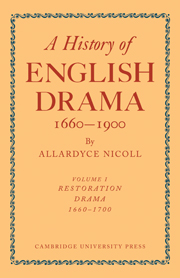Summary
Restoration Tragedy and Comedy: Introductory
On turning from the audience and the theatre to the actual dramatic works written during the reigns of Charles, James and William, we seem at first to meet with a totally different productivity from what we should have expected. The comedy of manners and the coarser comedy of humours were certainly reflexes of the gay immoral aristocratic life of the age. Nothing could more perfectly have mirrored the upper-class life of the time than the comedy of Etherege and of Congreve: nothing could have pictured more faithfully the debased standards of social existence than plays such as The Squire of Alsatia. Opera, also, we might have been prepared for, because in opera we see the quintessence of music, song, show and dance—precisely those things which, we found, appealed to a vast majority of the play-going public of the epoch. But neither opera nor comedy at all exhausts the dramatic productivity of these forty years: there is left out of account that most characteristic of all the Restoration theatrical species, the heroic tragedy. This heroic tragedy is obviously a thing entirely apart from the comedy of gay licentious manners. With its flaunting honour and its impossibly idealistic love passions, it seems indeed so far away both from that comedy and from social life as we have seen it displayed in the theatre that it would appear impossible to find any link between them.
- Type
- Chapter
- Information
- History of English Drama, 1660–1900 , pp. 84 - 180Publisher: Cambridge University PressPrint publication year: 1952



